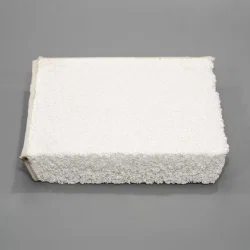Features and applications of ceramic filters
2024-02-19
Ceramic filters are filtration devices made from ceramic materials that provide a porous structure for separating particles and impurities from fluids. These filters are commonly used for water purification and filtration in various industries. Here are key features and applications of ceramic filters:
Key Features:
1. Porous Structure: Ceramic filters are designed with a porous structure that allows the passage of fluids while trapping and removing impurities. The porosity can vary, and the filters may have a combination of micropores and macropores.
2. Material Variety: Ceramic filters can be made from various ceramic materials, including clay, diatomaceous earth, alumina, and others. The choice of material depends on the intended application and the properties required for efficient filtration.
3. Chemical Resistance: Ceramic materials are often chemically resistant, making ceramic filters suitable for use with a wide range of liquids, including corrosive or aggressive substances.
4. Temperature Resistance: Ceramic filters can withstand high temperatures, making them suitable for applications where hot liquids or gases need to be filtered.
5. Long Lifespan: Ceramic filters are known for their durability and long lifespan. With proper maintenance and cleaning, they can be reused for an extended period.
6. Microfiltration: Ceramic filters can provide effective microfiltration, removing particles down to the submicron level, depending on the pore size of the filter.
Applications:
1. Water Filtration:
- Drinking Water: Ceramic water filters are commonly used for household water purification. They can effectively remove bacteria, parasites, sediment, and other impurities, providing clean and safe drinking water.
- Industrial Water Treatment: Ceramic filters are employed in industrial settings for the filtration of process water, wastewater, and various liquids.
2. Swimming Pool Filtration:
- Ceramic filters are used in swimming pool filtration systems to capture impurities, debris, and microorganisms from the water, helping maintain water quality.
3. Chemical Processing:
- Ceramic filters are utilized in chemical processing for the filtration of chemical solutions, catalyst recovery, and the removal of particulate matter from various process streams.
4. Food and Beverage Industry:
- Ceramic filters find applications in the food and beverage industry for the clarification of liquids, including the filtration of juices, syrups, and other liquid food products.
5. Gas Filtration:
- In some applications, ceramic filters are used for gas filtration, removing particulate matter and contaminants from gases in industrial processes.
6. Biomedical Applications:
- Ceramic filters are used in biomedical applications, such as filtering biological samples or separating particles in laboratory processes.
7. Oil Filtration:
- In certain industrial processes, ceramic filters can be used for the filtration of oils to remove impurities and extend the lifespan of lubricating oils.
8. Air Filtration:
- Some ceramic filters are designed for air filtration applications, capturing particles and contaminants in HVAC systems or air purifiers.
Ceramic filters offer advantages such as cost-effectiveness, reliability, and the ability to be cleaned and reused. However, the effectiveness of ceramic filters depends on factors such as pore size, flow rate, and the nature of the contaminants being filtered. Regular maintenance, cleaning, and monitoring are important to ensure optimal performance over time.



